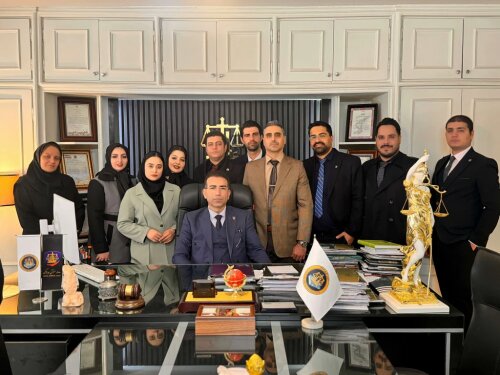Best Landlord & Tenant Lawyers in Mashhad
Share your needs with us, get contacted by law firms.
Free. Takes 2 min.
Free Guide to Hiring a Real Estate Lawyer
List of the best lawyers in Mashhad, Iran
About Landlord & Tenant Law in Mashhad, Iran
Landlord and tenant law in Mashhad, Iran, is governed by both national regulations under the Iranian Civil Code and specific local practices. The law covers the relationship between property owners (landlords) and those who lease or rent property (tenants), outlining the rights, responsibilities, and legal protections for both parties. Renting property is common in Mashhad, ranging from residential apartments to commercial spaces. Legal obligations arise from the rental contract, official governmental regulations, and customary practices, making it essential for both landlords and tenants to understand their rights and duties.
Why You May Need a Lawyer
While many rental agreements proceed without major problems, there are situations where legal assistance becomes important. Some of the common reasons you may need a lawyer in landlord and tenant matters in Mashhad include:
- Drafting or reviewing rental agreements to ensure legal compliance and protect your interests
- Resolving disputes related to rent increases, security deposits, late payments, or maintenance obligations
- Handling eviction proceedings, whether as a landlord seeking to regain possession or a tenant defending against unlawful eviction
- Managing disputes about property damage, repairs, or return of deposits
- Representation in court or before official bodies if negotiations fail
- Navigating the complexities of local regulations and changes in housing laws
Local Laws Overview
Mashhad follows the landlord and tenant rules established in the Iranian Civil Code and regulations from the Ministry of Roads and Urban Development. Key aspects of local law include:
- All rental agreements must be documented in writing and registered with the local real estate registry office for legal validity
- Security deposits (commonly called "rahn") are standard and must be returned at the end of the tenancy unless agreed deductions apply
- Landlords must respect a tenant's right to peaceful enjoyment and cannot enter the property without notice except in emergencies
- Eviction procedures require legal notice and, in most cases, must be approved by the court
- Rent increases are subject to regulation and may be capped by governmental guidelines, especially in times of economic stress
- Both parties are expected to maintain the property, with tenants responsible for minor repairs and landlords for structural or major repairs
- Dispute resolution may involve local councils, mediation centers, or the courts, depending on the case
Frequently Asked Questions
Is a written lease agreement mandatory in Mashhad?
Yes, written lease agreements are mandatory and must be registered with the local real estate registry for them to be legally enforceable.
Can a landlord increase the rent during the tenancy?
No, rent cannot be increased during the tenancy unless explicitly stated in the lease terms. At renewal, rent increases can only be made within legal limits set by government authorities.
What can a landlord deduct from the security deposit?
Landlords may deduct unpaid rent, utility bills, or costs for repairing damages beyond normal wear and tear. This must be justified with evidence.
How can a tenant be evicted in Mashhad?
Eviction must follow legal procedures, including serving advance notice and, if the tenant does not vacate, obtaining a court order.
Who is responsible for repairs?
Tenants handle minor repairs and maintenance, while landlords are responsible for structural, electrical, and plumbing repairs unless agreed otherwise in writing.
Can a landlord enter the property without notice?
Landlords must give reasonable notice before entering the rental property, except when there is an emergency.
What should I do if I have a dispute with my landlord or tenant?
First, attempt to resolve the issue through direct communication. If unsuccessful, use local mediation centers or seek legal advice for possible recourse in court.
Are there any government agencies to help with rental issues?
Yes, local offices of the Ministry of Roads and Urban Development and municipal mediation centers can assist with landlord and tenant disputes.
Can I sublet my apartment to another person?
Subletting is not allowed unless specifically permitted by the lease agreement and with the landlord's written consent.
What documents do I need to initiate a legal case regarding tenancy?
Bring your rental contract, identification documents, proof of payment, and any evidence supporting your case, such as photos or correspondence.
Additional Resources
Several resources and organizations can assist those dealing with landlord and tenant issues in Mashhad:
- Ministry of Roads and Urban Development - Local Housing and Rental Affairs section
- Municipal Mediation and Dispute Resolution Centers
- Mashhad Real Estate Union (Union of Real Estate Consultants)
- Local Judiciary Office (for court-based disputes)
- Legal Aid Centers providing support for low-income individuals
Next Steps
If you require legal assistance in a landlord and tenant matter in Mashhad, consider the following steps:
- Gather all relevant documentation such as lease agreements, receipts, and correspondence
- Document your concerns and any relevant events with dates and details
- Attempt direct communication or informal mediation with the other party
- If unresolved, contact the appropriate government body or mediation center
- For complex or high-value cases, seek a qualified lawyer experienced in landlord and tenant law in Mashhad
- Attend any required legal proceedings fully prepared with all necessary documents
Lawzana helps you find the best lawyers and law firms in Mashhad through a curated and pre-screened list of qualified legal professionals. Our platform offers rankings and detailed profiles of attorneys and law firms, allowing you to compare based on practice areas, including Landlord & Tenant, experience, and client feedback.
Each profile includes a description of the firm's areas of practice, client reviews, team members and partners, year of establishment, spoken languages, office locations, contact information, social media presence, and any published articles or resources. Most firms on our platform speak English and are experienced in both local and international legal matters.
Get a quote from top-rated law firms in Mashhad, Iran — quickly, securely, and without unnecessary hassle.
Disclaimer:
The information provided on this page is for general informational purposes only and does not constitute legal advice. While we strive to ensure the accuracy and relevance of the content, legal information may change over time, and interpretations of the law can vary. You should always consult with a qualified legal professional for advice specific to your situation.
We disclaim all liability for actions taken or not taken based on the content of this page. If you believe any information is incorrect or outdated, please contact us, and we will review and update it where appropriate.










